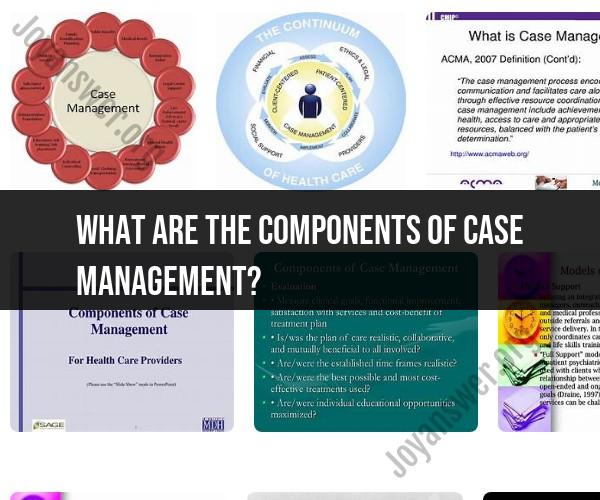What are the components of case management?
Case management is a holistic approach to coordinating and managing the care and services for individuals who may require assistance with their health, social, and human service needs. The components of case management typically involve a range of activities and responsibilities aimed at ensuring that the client's needs are met effectively. Here are the key components of case management:
Assessment and Evaluation:
- The case manager conducts a thorough assessment of the client's needs, strengths, and goals. This includes gathering information about their physical and mental health, social and economic circumstances, and any other factors relevant to their well-being.
Goal Setting and Planning:
- Based on the assessment, the case manager collaborates with the client to set specific, measurable, achievable, relevant, and time-bound (SMART) goals. These goals may encompass various aspects of the client's life, such as health, housing, employment, or education.
Resource Identification and Coordination:
- Case managers identify and connect clients to the appropriate resources and services in the community. This may include healthcare providers, social services, housing assistance, educational programs, and more.
Advocacy:
- Case managers often serve as advocates for their clients, helping them access the services and support they need. They may also advocate for the client's rights and ensure they are treated fairly and respectfully.
Monitoring and Follow-Up:
- Case managers continuously monitor the client's progress toward their goals and ensure they are following their care plan. This may involve regular check-ins, assessing whether the plan is effective, and making necessary adjustments.
Documentation and Record Keeping:
- Case managers maintain accurate and detailed records of the client's information, assessments, plans, and outcomes. This documentation helps track the client's history and progress.
Collaboration and Communication:
- Effective case management often involves collaborating with a multidisciplinary team of professionals, including doctors, therapists, social workers, and other service providers. Communication and coordination among team members are essential.
Crisis Intervention:
- Case managers are prepared to handle crises or emergencies that may arise in the client's life. They work to find solutions and support the client during difficult times.
Education and Support:
- Case managers provide education to clients and their families, empowering them to make informed decisions about their health and well-being. They also offer emotional support and guidance.
Quality Assurance:
- Case managers may assess the quality of services provided to clients and ensure that services meet relevant standards and guidelines.
Closure and Transition:
- When the client has achieved their goals or no longer requires case management, the case manager helps with the transition process, which may include ensuring continuity of care and referring the client to appropriate ongoing services.
Ethical and Legal Considerations:
- Case managers are expected to adhere to ethical and legal standards, maintaining client confidentiality and respecting their rights and preferences.
Case management is a flexible process, and the specific components and approach may vary depending on the client's unique needs, the setting (e.g., healthcare, social services, mental health), and the organization or agency providing the services. The primary focus of case management is to empower individuals to improve their quality of life by coordinating and facilitating access to the right services and resources.
Components of Case Management: Building Supportive Systems
Case management is a collaborative process that assesses, plans, implements, and coordinates services to meet the needs of clients and their families. Case managers work with clients to identify their goals, develop plans to achieve those goals, and connect them with the resources and support they need.
One of the most important components of case management is building supportive systems. Supportive systems can include family members, friends, neighbors, community organizations, and other professionals. Case managers can help clients to identify and connect with supportive systems that can provide them with the emotional, practical, and financial support they need.
The Role and Function of Case Management in Different Fields
Case management is used in a variety of fields, including healthcare, social services, education, and the criminal justice system. Case managers in different fields may have different roles and functions, but they all share the common goal of helping clients to achieve their goals and improve their quality of life.
Healthcare: Case managers in healthcare work with patients and their families to coordinate care, manage chronic conditions, and transition from hospital to home care. They may also help patients to access insurance and financial assistance.
Social services: Case managers in social services work with clients to address a variety of needs, such as poverty, homelessness, and mental illness. They may help clients to find housing, employment, and other essential services.
Education: Case managers in education work with students and their families to identify and overcome barriers to learning. They may help students to develop academic plans, access resources, and transition from school to work or college.
Criminal justice system: Case managers in the criminal justice system work with offenders and their families to address the factors that contribute to crime and recidivism. They may help offenders to find housing, employment, and treatment for substance abuse and mental illness.
Navigating Case Management with a Multidisciplinary Approach
Case management is a complex process that often requires a multidisciplinary approach. Case managers may work with a variety of professionals, such as doctors, nurses, social workers, teachers, and lawyers, to develop and implement care plans for their clients.
Effective case management requires case managers to have a good understanding of the different resources and services that are available to their clients. Case managers must also be able to communicate effectively with other professionals and coordinate their efforts to ensure that clients receive the best possible care.
Success Stories and Best Practices in Case Management
There are many success stories and best practices in case management. For example, case management has been shown to be effective in improving the health outcomes of patients with chronic diseases, reducing recidivism rates among offenders, and helping students to succeed in school.
One of the best practices in case management is to focus on the client's strengths and abilities. Case managers should work with clients to identify their strengths and resources, and to develop plans that build on those strengths.
Another best practice in case management is to involve the client in the decision-making process. Case managers should work with clients to develop goals and plans that are meaningful to them. Case managers should also respect the client's right to make their own decisions, even if those decisions are not what the case manager would recommend.
Personal Perspectives and Experiences in Case Management
Case managers often have rewarding careers. They are able to make a real difference in the lives of their clients and their families.
Here is a personal perspective from a case manager in the healthcare field:
"I love being a case manager because I get to help people when they need it most. I work with patients and their families to coordinate care, manage chronic conditions, and transition from hospital to home care. It's incredibly rewarding to see my clients improve their quality of life."
Case management is a challenging but rewarding profession. Case managers play an important role in helping people to achieve their goals and improve their lives.











